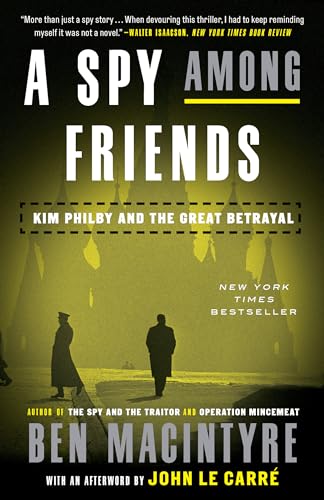Articles liés à A Spy Among Friends: Kim Philby and the Great Betrayal

Synopsis
NEW YORK TIMES BESTSELLER - The epic true story of Kim Philby, the Cold War's most infamous spy, from the "master storyteller" (San Francisco Chronicle) and author of Prisoners of the Castle.
Now an MGM+ series starring Damian Lewis, Guy Pearce, and Anna Maxwell Martin"[A Spy Among Friends] reads like a story by Graham Greene, Ian Fleming, or John le Carré, leavened with a dollop of P. G. Wodehouse."--Walter Isaacson, New York Times Book Review Who was Kim Philby? Those closest to him--like his fellow MI6 officer and best friend since childhood, Nicholas Elliot, and the CIA's head of counterintelligence, James Jesus Angleton--knew him as a loyal confidant and an unshakeable patriot. Philby was a brilliant and charming man who rose to head Britain's counterintelligence against the Soviet Union. Together with Elliott and Angleton he stood on the front lines of the Cold War, holding Communism at bay. But he was secretly betraying them both: He was working for the Russians the entire time. Every word uttered in confidence to Philby made its way to Moscow, sinking almost every important Anglo-American spy operation for twenty years and costing hundreds of lives. So how was this cunning double-agent finally exposed? In A Spy Among Friends, Ben Macintyre expertly weaves the heart-pounding tale of how Philby almost got away with it all--and what happened when he was finally unmasked. Based on personal papers and never-before-seen British intelligence files and told with heart-pounding suspense and keen psychological insight, A Spy Among Friends is a fascinating portrait of a Cold War spy and the countrymen who remained willfully blind to his treachery. ONE OF THE BEST BOOKS OF THE YEAR: The New York Times Book Review, The Washington Post, Entertainment Weekly, Shelf Awareness
Les informations fournies dans la section « Synopsis » peuvent faire référence à une autre édition de ce titre.
À propos de l?auteur
Ben Macintyre is a writer-at-large for The Times of London and the bestselling author of Double Cross, Operation Mincemeat, Agent Zigzag, The Napoleon of Crime, and Forgotten Fatherland, among other books. Macintyre has also written and presented BBC documentaries of his work.
Les informations fournies dans la section « A propos du livre » peuvent faire référence à une autre édition de ce titre.
EUR 5,60 expédition depuis Etats-Unis vers France
Destinations, frais et délaisAcheter neuf
Afficher cet articleEUR 2,29 expédition depuis Royaume-Uni vers France
Destinations, frais et délaisRésultats de recherche pour A Spy Among Friends: Kim Philby and the Great Betrayal
A Spy Among Friends: Kim Philby and the Great Betrayal
Vendeur : ThriftBooks-Atlanta, AUSTELL, GA, Etats-Unis
Paperback. Etat : Fair. No Jacket. Readable copy. Pages may have considerable notes/highlighting. ~ ThriftBooks: Read More, Spend Less 0.87. N° de réf. du vendeur G0804136653I5N00
Quantité disponible : 3 disponible(s)
A Spy Among Friends: Kim Philby and the Great Betrayal
Vendeur : ThriftBooks-Atlanta, AUSTELL, GA, Etats-Unis
Paperback. Etat : Good. No Jacket. Pages can have notes/highlighting. Spine may show signs of wear. ~ ThriftBooks: Read More, Spend Less 0.87. N° de réf. du vendeur G0804136653I3N00
Quantité disponible : 2 disponible(s)
A Spy Among Friends: Kim Philby and the Great Betrayal
Vendeur : ThriftBooks-Phoenix, Phoenix, AZ, Etats-Unis
Paperback. Etat : Good. No Jacket. Pages can have notes/highlighting. Spine may show signs of wear. ~ ThriftBooks: Read More, Spend Less 0.87. N° de réf. du vendeur G0804136653I3N00
Quantité disponible : 1 disponible(s)
A Spy Among Friends: Kim Philby and the Great Betrayal
Vendeur : ThriftBooks-Reno, Reno, NV, Etats-Unis
Paperback. Etat : Good. No Jacket. Pages can have notes/highlighting. Spine may show signs of wear. ~ ThriftBooks: Read More, Spend Less 0.87. N° de réf. du vendeur G0804136653I3N00
Quantité disponible : 2 disponible(s)
A Spy Among Friends: Kim Philby and the Great Betrayal
Vendeur : ThriftBooks-Dallas, Dallas, TX, Etats-Unis
Paperback. Etat : Good. No Jacket. Pages can have notes/highlighting. Spine may show signs of wear. ~ ThriftBooks: Read More, Spend Less 0.87. N° de réf. du vendeur G0804136653I3N00
Quantité disponible : 2 disponible(s)
A Spy Among Friends: Kim Philby and the Great Betrayal
Vendeur : BooksRun, Philadelphia, PA, Etats-Unis
Paperback. Etat : Fair. Reprint. Ship within 24hrs. Satisfaction 100% guaranteed. APO/FPO addresses supported. N° de réf. du vendeur 0804136653-7-1
Quantité disponible : 1 disponible(s)
A Spy Among Friends: Kim Philby and the Great Betrayal
Vendeur : BooksRun, Philadelphia, PA, Etats-Unis
Paperback. Etat : Good. Reprint. Ship within 24hrs. Satisfaction 100% guaranteed. APO/FPO addresses supported. N° de réf. du vendeur 0804136653-11-1
Quantité disponible : 1 disponible(s)
A Spy Among Friends: Kim Philby and the Great Betrayal
Vendeur : WorldofBooks, Goring-By-Sea, WS, Royaume-Uni
Paperback. Etat : Very Good. The book has been read, but is in excellent condition. Pages are intact and not marred by notes or highlighting. The spine remains undamaged. N° de réf. du vendeur GOR007347049
Quantité disponible : 4 disponible(s)
A Spy among Friends : Kim Philby and the Great Betrayal
Vendeur : Better World Books, Mishawaka, IN, Etats-Unis
Etat : Very Good. Used book that is in excellent condition. May show signs of wear or have minor defects. N° de réf. du vendeur 4759006-6
Quantité disponible : 5 disponible(s)
A Spy among Friends : Kim Philby and the Great Betrayal
Vendeur : Better World Books: West, Reno, NV, Etats-Unis
Etat : Good. Former library book; may include library markings. Used book that is in clean, average condition without any missing pages. N° de réf. du vendeur 8394596-6
Quantité disponible : 2 disponible(s)

